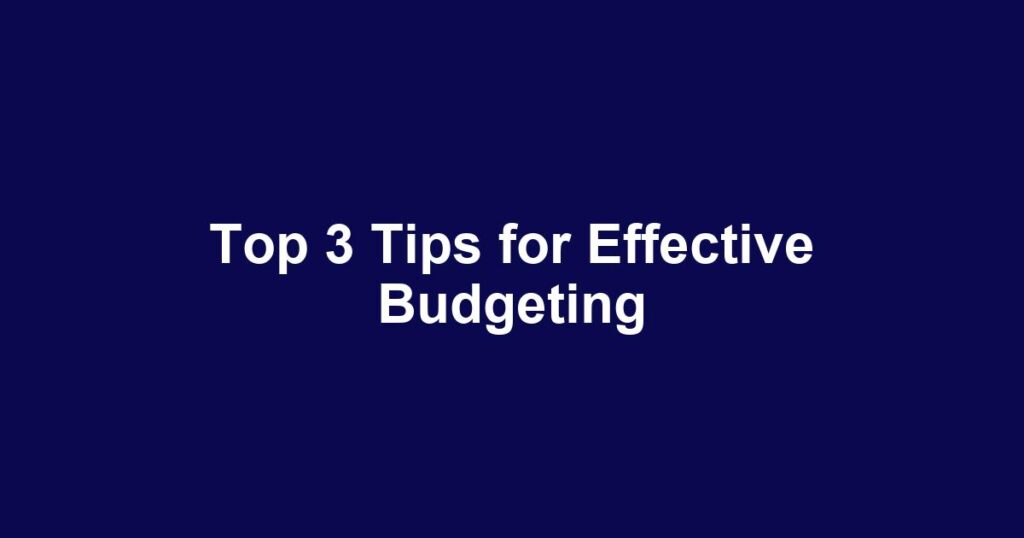Top 3 Tips for Effective Budgeting
Effective budgeting is a cornerstone of personal finance and financial planning. Whether you’re trying to save for a new car, pay off debt, or just have better control over your financial life, mastering budgeting is crucial. But how do you ensure that your budgeting efforts are effective? In this article, we will reveal three top tips for effective budgeting that can transform your financial situation and lead to a healthier financial lifestyle. Let’s dive in!
Understanding the Basics of Budgeting
Before we get into the tips, let’s clarify what budgeting is. Budgeting involves creating a plan to manage your income and expenses. It helps you track where your money goes and allows you to allocate funds according to your priorities. The basic components of budgeting are:
- Income: Money you earn from all sources.
- Expenses: All your monthly outflows, including fixed and variable costs.
- Savings: Funds set aside for future needs or emergencies.
With these components in mind, let’s explore the three essential tips for effective budgeting.
Tip 1: Track Your Spending
What Is Spending Tracking?
Spending tracking is the process of monitoring your daily, weekly, and monthly expenses. It plays an integral role in effective budgeting as it provides insights into your spending habits and helps identify areas where you can cut back.
How to Track Your Spending
- Use a budgeting app: Many apps like Mint, You Need a Budget (YNAB), or Personal Capital make tracking easy. They allow you to categorize expenses and set budget limits.
- Maintain a spreadsheet: If you prefer manual tracking, creating a spreadsheet can help you visualize your income and expenses.
- Review bank statements: Periodically check your bank and credit card statements to see where most of your money goes.
Why Does Tracking Matter?
By tracking your spending, you gain awareness of your financial habits. It provides motivation and accountability, revealing opportunities for saving and better financial planning.
Tip 2: Create a Realistic Budget
What Does a Realistic Budget Look Like?
A realistic budget aligns with your income and lifestyle. It accounts for fixed necessities and allows for discretionary spending and savings. Here’s how to create one:
Steps to Creating a Realistic Budget
- List your income: Include all sources of income, such as salary, freelancing, or passive income streams.
- Identify necessary expenses: Categorize your monthly fixed expenses like rent, utilities, and insurance.
- Determine variable expenses: Allocate a portion for food, entertainment, and other discretionary spending.
- Set savings goals: Decide how much you want to save each month for emergencies, retirement, or future investments.
- Adjust as needed: Life changes; therefore, be flexible and adjust your budget periodically.
Tip 3: Review and Adjust Regularly
Why Review Your Budget?
Regularly reviewing your budget is essential for long-term success in financial planning. Life circumstances and expenses change, making it crucial to adapt your budget accordingly.
How Often Should You Review Your Budget?
- Monthly check-ins: At the end of each month, assess your spending against your budget.
- Quarterly reviews: Consider a more in-depth review every few months to analyze overall progress and reevaluate your financial goals.
- Life events: Events such as job changes, moving, or having a child warrant immediate budgeting adjustments.
Tips for Effective Budget Review
- Utilize reports: Budgeting apps often provide reports helping to visualize spending patterns.
- Celebrate achievements: Acknowledge progress towards savings goals or reduced spending.
- Identify non-fixed expenses: Look for areas where you can cut back without sacrificing quality of life.
Conclusion
Budgeting is an essential skill for anyone looking to improve their personal finances. By tracking your spending, creating a realistic budget, and regularly reviewing it, you can make informed decisions that bolster your financial health. The journey to successful budgeting may take time, but with these top tips, you’ll be equipped to take charge of your financial future.
Feeling inspired to start budgeting now? Take control of your personal finance today with these actionable strategies and embark on a rewarding financial planning journey.
Remember, effective budgeting is not just about saving money—it’s about creating the life you want through informed and strategic financial choices.
Are you ready to transform your financial journey? Start implementing these budgeting tips today!

